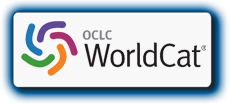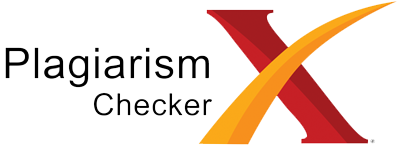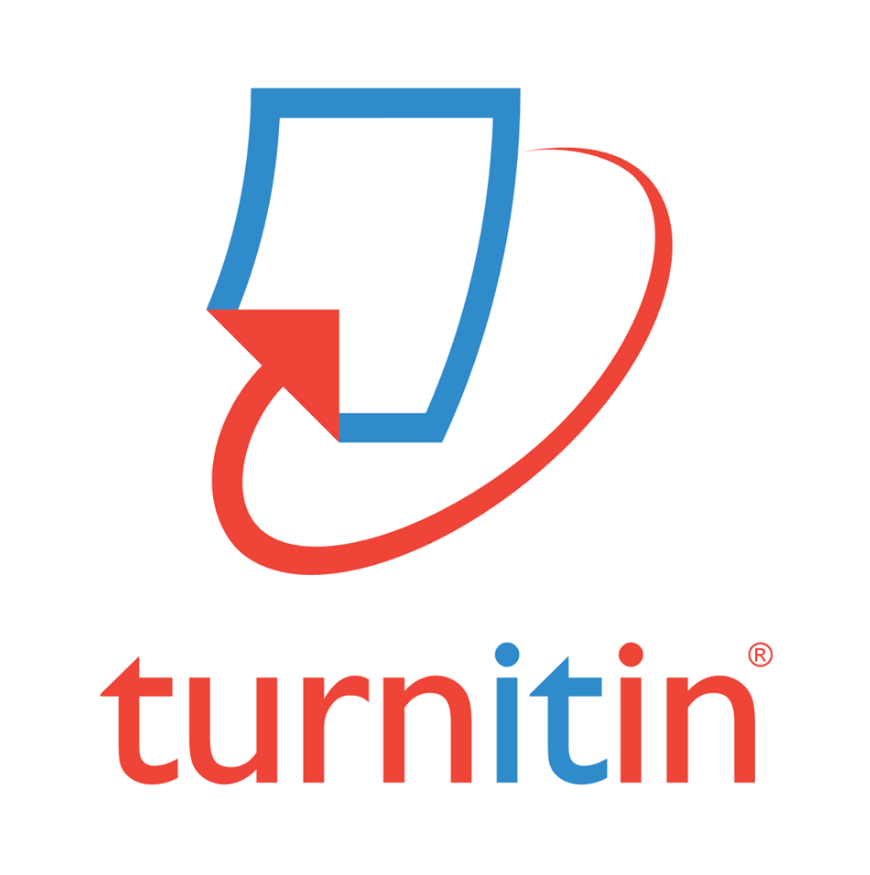Pengaruh Strategi Pembelajaran dan Gaya Berpikir Terhadap Hasil Belajar Sejarah Siswa SMA
Abstract
Abstrak: Penelitian ini bertujuan untuk mengetahui pengaruh strategi pembelajaran group investigation dan strategi pembelajaran eskpositori terhadap hasil belajar sejarah, pengaruh gaya berpikir vertikal dan gaya berpikir lateral terhadap hasil belajar sejarah, dan pengaruh interaksi antara strategi pembelajaran dan gaya berpikir terhadap hasil belajar sejarah. Penelitian ini menggunakan desain eksperimen kuasi versi faktorial 2x2 pretest posttest nonequivalent control group design. Subjek penelitian adalah siswa kelas XI pada tiga SMA Negeri di Kabupaten Sigi yang dipilih dengan metode cluster random sampling. Subjek yang dilibatkan sebanyak 112 orang yang terbagi ke dalam enam kelas. Data penelitian dikumpulkan menggunakan intrumen gaya berpikir dan tes hasil belajar dan pengujian hipotesis dilakukan pada taraf signifikansi 5%. Hasil penelitian menunjukkan temuan sebagai berikut: 1) secara deskriptif strategi pembelajaran group investigation lebih unggul dibanding dengan strategi pembelajaran eskpositori dalam menigkatkan hasil belajar sejarah; 2) kelompok sisiwa memiliki gaya berpikir vertikal, memiliki hasil belajar sejarah yang lebih unggul dibanding dengan kelompok siswa yang memiliki gaya berpikir lateral; dan 3) terdapat pengaruh interaksi antara strategi pembelajaran dan gaya berpikir terhadap hasil belajar sejarah. Hasil penelitian ini menginformasikan bahwa strategi pembelajaran group investigation berpengaruh secara signifikan terhadap hasil belajar sejarah bergantung pada gaya berpikir siswa.
Abstract: This study aims to determine the effect of group investigation learning strategies and expository learning strategies on historical learning outcomes, the effect of vertical and lateral thinking styles on historical learning outcomes, and the influence of the interaction between learning strategies and thinking styles on historical learning outcomes. This study used a quasi-experimental design with a 2x2 factorial version of the pretest posttest nonequivalent control group design. The research subjects were students of class XI at three public high schools in Sigi Regency who were selected by the cluster random sampling method. Subjects were involved as many as 112 people who were divided into six classes. The research data were collected using thinking style instruments and learning outcomes tests and hypothesis testing was carried out at the 5% significance level. The results showed the following findings: 1) descriptively, the group investigation learning strategy was superior to the expository learning strategy in increasing the learning outcomes of history; 2) the student group has a vertical thinking style, has superior historical learning outcomes compared to the student group who has a lateral thinking style; and 3) there is an interaction effect between learning strategies and thinking styles on historical learning outcomes. The results of this study informed that the group investigation learning strategy had a significant effect on history learning outcomes depending on students' thinking styles.
Keywords
Full Text:
PDFReferences
Abordo, I & Gaikwad S. (2005). Group investigation: How does it work? International Forum, 8 (1&2): 79- 98.
Akçay, N. O & Doymuş, K. (2012). The effects of group investigation and cooperative learning techniques applied in teaching force and motion subjects on students’academic achievements. Journal of Educational Sci. Research. 2 (1): 109-123.
Ananda, R. (2012). Pengaruh strategi pembelajaran dan gaya berpikir terhadap hasil belajar matematika madrasah ibtidaiyah negeri kota medan. http://digilib.unmed.ac.id/ (diakses tanggal 7 Juli 2013).
Anderson, L. W & Krathwohl, D. R. (2001). A taxonomy for learning, teaching and assessing: A revision of bloom’s taxonomy of educational objectives. New York: Addison Wesley Longman, Inc.
Bloom,B.S. (1979). Taxonomy of educational objectives: The classification of educational goals. London: Longman Group Ltd.
Bono,De E. (1978). Lateral thinking, a textbook of creativity. New York: Penguin Books.
Cohen, L., Lawrance, M., & Keith, M. (2011). Research methods in education (7th edition). London;
Routledge.
Crowl, T. K., Kaminsky, S., & Podell, D. M. (1997). Educational psychology: Windows on teaching. Dubuque: Brown and Benchmark.
Degeng, Nyoman S. (2013). Ilmu pembelajaran, klasifikasi variabel untuk pengembangan teori dan penelitian. Bandung: Aras Media.
Depary, Suasana,& Mukhtar. (2013). Model pembelajaran dan gaya berpikir terhadap hasil belajar fisika. Jurnal Teknologi Pendidikan, 6 (1): 93-107.
Dewey, J. (2011). Democracy and education. New York : Mc Millan.
Dewi, R. P., Iswari, Retno S., & Susanti, R. (2012). Penerapan model group investigation terhadap hasil belajar materi bahan kimia di smp. Unnes Science Education Journal, 1(2). http://journal.unnes.ac.id/ . 7 Nopember 2012.
Dick, W& Carey, L. (1996). The systemic design of instructional (4thedition). New York: Harper Collins College Publishers.
Fauzi, A. (2013). Pengaruh model pembelajaran kooperatif tipe group investigation terhadap hasil belajar siswa pada materi pokok listrik dinamis di kelas ix semester i smp swasta an-nizam medan t.p 2012/2013. http://digilib.unimed. ac.id/diakses tanggal 3 Januari 2014).
Guilford, J. P &Frutchner, B. (1981). Fundamental statistics in psychology and education. New York: McGrawHill Book Company.
Harahap, M.N. (2011). Pengaruh strategi pembelajaran dan kemampuan berpikir kritis terhadap hasil belajar algoritma dan pemrograman di amik pematang siantar. Jurnal Tekhnologi Pembelajaran,4 (1): 86-103.
Hill, S& Hill. (1993). The Collaborative classroom : A guide to cooperative learning. Victoria: Elianor Curatain Publishing.
Joyce, B& Weil, M. (2009). Models of teaching. New Jersey: PrenticeHall, Inc.
Kumalasari, D. (2005). Sejarah dan problema pendidikan. Istoria. Edisi Pertama.
Lazarowitz, R & Karsenty, G. (1990). Cooperative learning and students’ academic achievement, process skills, learning environment, and self esteem in tenthgrade biology classrooms. in S. Sharan(Ed) Cooperative Learning: Theory and Reasearch. NewYork:Praeger.
Manullang, M. (2013). Pengaruh strategi pembelajaran dan gaya berpikir terhadap hasil belajar ekonomi siswa di sma dwiwarna dan sma parulian 1 medan. http://digilib.unimed.ac.id/. (Diakses 7 Januari 2014.
Meutia, N. (2008). Pengaruh strategi pembelajaran dan gaya belajar terhadap hasil belajar sejarah. Jurnal Teknologi Pendidikan. 10 ( 2): 11- 15.
Pasaribu, K & Sibuea, A.M. (2013). Strategi pembelajaran dan kecenderungan perilaku agresif terhadap hasil belajar kewirausahaan. Jurnal Teknologi Pendidikan, 6 (1): 31-46.
Patahuddin. (2008). Pengaruh model penilaian formatif dan gaya berpikir terhadap hasil belajar sejarah. Disertasi. Jakarta: Pascasarjana Universitas Negeri Jakarta.
Pinayungan, M. (2010). Pengaruh strategi pembelajaran dan gaya berpikir terhadap hasil belajar bahasa indonesia siswa sd negeri 142631 dan 144463 madina. http://www.google.com/(diakses tanggal 2Maret 2013).
Purba, T & Sitompul, H. (2013). Strategi pembelajaran dan motif berprestasi terhadap hasil belajar mata pelajaranmenggambar teknik. Jurnal Teknologi Pendidikan, 6 (1): 108-121.
Rahmawati, E. R. (2012). Penerapan model pembelajaran kooperatif tipe group investigation (GI) untuk meningkatkan keaktifan belajar dan hasilbelajar mata pelajaran sosiologi padasiswa kelas x3 sma negeri colomadu tahun pelajaran 2011/2012. Jurnal Sosialitas. 2 (1): 45-49.
Reigeluth, C.M. (1983). Instructional design: What is it and why is it? dalam C.M. Reigeluth (Ed.), Instructional Design Theories and Models: An Overview of Their Current Status. (3-36). Hillsdale, N.J.: Lawrence Erlbaum Associates.
Richvana, A., Dwiastuti, S.,& Baskoro, A. P. (2012). Pengaruh model pembelajaran group investigation terhadap hasil belajar biologi ditinjau dari tingkat kreativitas siswa kelas x sman 2 karanganyar. Pendidikan Biologi. 4 (1): 1-14.
Santyasa, I Wayan. (2013). Pengembangan pemahaman konsep dan kemampuan pemecahan masalah fisika bagi siswa sma dengan pemberdayaan model perubahan konseptual berseting
investigasi kelompok. http://www.freewebs.com/ (diakses tanggal 28 Pebruari 2013).
Seriti, Ni Nyoman., Candiasa., & Natajaya, I Nyoman. (2013). Pengaruh strategi pembelajaran heuristikdan algoritmik terhadap hasil belajar teknologi informasi dan komunikasi ditinjau dari gaya berpikir siswa kelas xi sma negeri 3 amlapura. Jurnal Penelitian Pascasarjana Undiksha. Vol. 4 No. 1.http://pasca. undiksha.ac.ic/ (diakses tanggal 8 Januari 2014).
Shackar, H & Fischer, S. (2004). Cooperative learning and the achievement of motivation and
perceptions of students in 11th grade chemistry classes. Learning and Instruction, 14: 69-87.
Sharan, S., Kussel, P., Hertz-Lazarowitz, R., Bejarano, Y., Raviv, S., & Sharan, Y. (1984). Cooperative
learning in the classroom: Research in desagregated school. Hillsdale, NJ: Erlbaum.
Siagian, S & Tanjung, P. (2012). Pengaruh strategi pembelajaran dan gaya belajar terhadap hasil belajar ipa kelas viii siswa smp negeri 1 dolok panribun. Jurnal Teknologi Pendidikan. 1 (2): 189-204.
Şimsek, U. (2012). The Effects of reading-writing-presentation and group investigation methods on
students’ academic achievements in citizenship lessons. Journal of Educational Sci. Research. 2 (2): 189-201.
Sitompul, J. N. (2014). Pengaruh strategi pembelajaran dan gaya berpikir terhadap hasil belajar fisika pada siswa smps ahmad yani binjai dan smps gajah mada binjai. http://digilib.unimed.ac.id/. (diakses 1 Maret 2014).
Sudjana, N. (2011). Penilaian hasil proses belajar mengajar. Bandung: Remaja Rosdakarya.
Suryabrata, S. (2005). Pengembangan alat ukur psikologi. Yogyakrta: Andi.
Susilawati, S. (2013). Pengaruh strategi pembelajaran dan gaya berpikir terhadap hasil belajar matematika siswa smp negeri 1 di rayeuk kabupaten aceh timur. http://digilib.unimed.ac.id/. (diakses tanggal 3 Januari 2014).
Suyuti. (2012). Pengaruh bentuk tes formatif dan gaya berpikir terhadap hasil belajar sejarah
dengan mengontrol kemampuan penalaran siswa. Disertasi.Jakarta: Pascasarjana Universitas Negeri
Jakarta.
Tsoi, M. F., Goh, N. K., & Chia, L. S. (2000). Modeling of group investigation in science teacher education. In. C. Lertchalolarn et al. (Eds.) Proceedings of International Conference on Reforming Teacher Education for the New Millennium: Searching for the New Dimension. Thailand Chulalongkorn University Printing House.
Tuckman, B. W. (1999). Conducting educational research. (4th edition). Orlando: Harrcourt Brace Colleg Publisher.
Wiratana, I Ketut., Sadia, I Wayan., & Suma, Ketut. (2013). Pengaruh model pembelajaran kooperatif
tipe group investigation terhadap keterampilan proses dan hasil belajar sains siswa smp. e-journal
Program Pascasarjana Universitas Pendidikan Ganesha Program Studi IPA. Vol. 3: 9-12.
Wiryadi, Ni Ketut. (2010). Pengaruh model pembelajaran kooperatif tipe group investigation terhadap hasil belajar kimia dengan mempertimbangkan kreativitas siswa. Jurnal Penelitian
Pascasarjana Undiksha. 2 (1): 18-22.
Zingaro, D. (2008). Group investigation: Theory and Practice. Retrieved August 10, 2009, from http://www.danielzingaro.com/ (diakses tanggal 16 Januari 2013).
Refbacks
- There are currently no refbacks.
Copyright (c) 2017 Lukman Nadjamuddin, Nyoman Sudana Degeng, Wasis D Dwijogo, Muhammad Nur Ali

This work is licensed under a Creative Commons Attribution-ShareAlike 4.0 International License.
Edcomtech: Jurnal Kajian Teknologi Pendidikan published by Department of Educational Technology, Faculty of Education, State University of Malang in Collaboration with Asosiasi Program Studi Teknologi Pendidikan Indonesia (APS TPI) and Ikatan Profesi Teknologi Pendidikan Indonesia (IPTPI) with MoU.
Publisher Address:
Lab. Teknologi Pendidikan, Gd.E2, Lt.1
Fakultas Ilmu Pendidikan Universitas Negeri Malang
Jalan Semarang No 5, Kota Malang Kode Pos 65145
Email: edcomtech.fip@um.ac.id
========================================================================================================
| INDEXED BY | TOOLS | PLAGIARISM CHECK | ARTICLE TEMPLATE |
|

Edcomtech is licensed under a Creative Commons Attribution-ShareAlike 4.0 International License.
Edcomtech Statistics (Since July 13th, 2020)

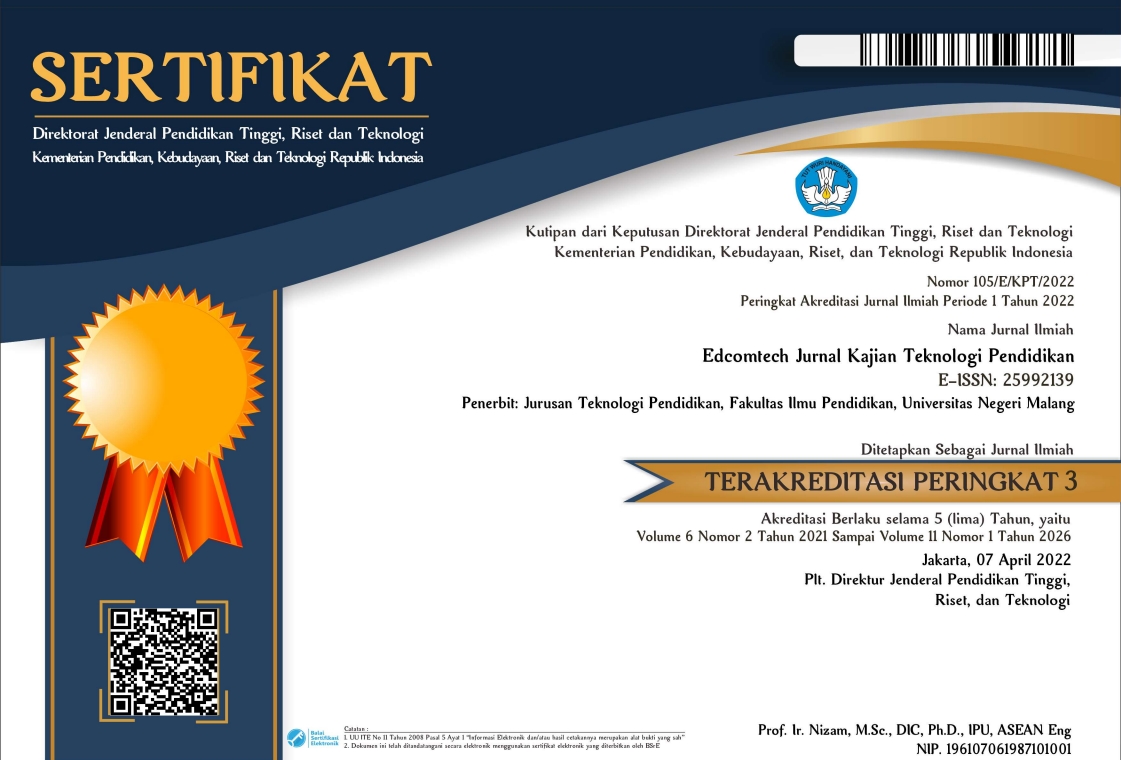



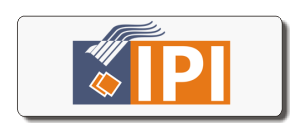





1.png)
